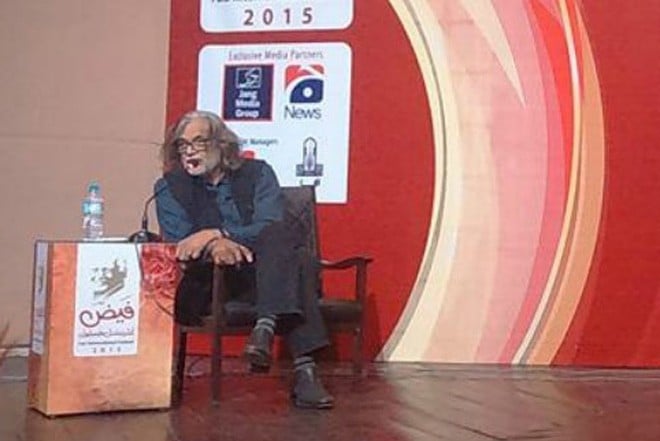
When the famed director Muzaffar Ali was asked for his thoughts on his seminal classic…

As the air of autumn slowly settles in, the city of Lahore yawns itself out of the lengthy afternoon nap the harsh summer had forced upon it. So this weekend that passed was marked by a quiet honour. Muzaffar Ali the director of the famed Indian classic Umrao Jan -- the lovely courtesan who defies the Indo-Pak divide, having first been rendered onto the silver screen in Pakistan, and later sculpted by Ali as a celluloid princess in India -- was present in Lahore for the International Faiz Festival.
In an interview concurrently conducted by Mira Hashmi and Sarmad Khoosat, Muzaffar Ali was asked for his thoughts on his seminal classic before a reverent audience of eighty or so of the otherwise thousands of mastaanay of Umrao Jan’s eyes that surely must be hidden somewhere or other in this city. The discussions ranged from the practical and prosaic such as the casting process for the film, to the deep and complex such as the role of the arts and language in human affairs. Muzaffar Ali’s responses with regards to Umrao Jan were those of a person who has engaged so fully with the film so as to have lived it. On the more abstract questions asked of him he displayed a humility that only someone genuinely caring of the arts can muster.
For the panel discussion to be opened to the audience as well toward the end was only fitting, considering that those present in the pews would quote freely from the film, on one occasion even correcting the panelists on a minor point. When asked what characteristic of Umrao Jan prompted Ali to pursue the idea of re-making the film in India, he responded that it was the helplessness of the characters, Nawabs and courtesans alike. This very human trait of powerlessness before forces grand and small seemed to be a source of inspiration for the famed director.
His decision to cast Rekha-ji too was closely tied to this theme, pointing out that he saw in her eyes the ability to convey the grand weight of powerlessness that is so central to the headline character of the film. Though it must be pointed out, as was done by a member of the audience, that it was a feat of directorial expertise even more so than the demure gaze of Rekha-ji that resulted in the portrayal of Umrao Jan as a heroine par none in the pantheon of Indian cinema.
Those present for the talk left much the richer, perhaps with more than a few enervating thoughts to sustain them for the winter that beckons ahead. And those uninitiated in the charms and delicacy of Umrao Jan’s nakhra, such as myself, left with a burgeoning urge to watch the classic film at once.
One cannot think of a better introduction to the film than that given to me by Muzaffar Ali. Perhaps to have sipped it out of Umrao Jan’s chalice alone could have been an improvement for, ‘Ik sirf ham hi mei ko ankhon se pilatein hain, Kehne ko tou dunya mein meikhanay hazaaron hain’.